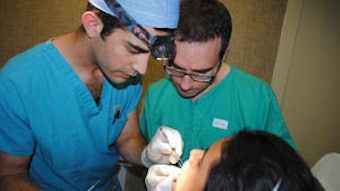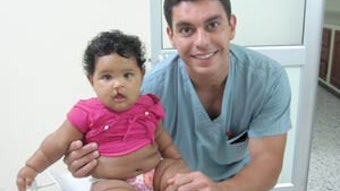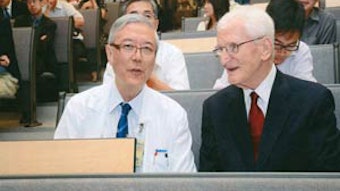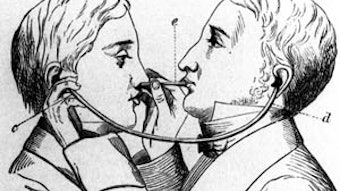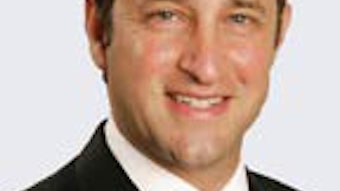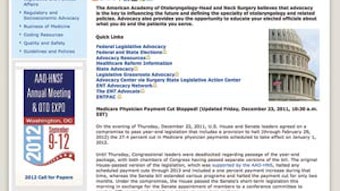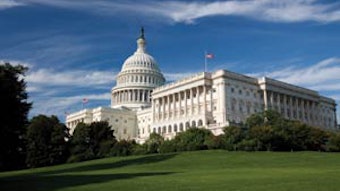AAO-HNS Comments: 2012 Medicare Physician Fee Schedule Final Rule
The 2012 final rule for the Medicare Physician Fee Schedule was put on public display on Nov. 1, 2011, and was published in the Nov. 28, 2011, issue of the Federal Register. Within the final rule, there were many issues the Academy commented on to the Centers for Medicare and Medicaid Services (CMS) in August 2011 for the interim rule and in January for the final rule. These comment letters can be found on the Academy’s website at http://www.entnet.org/Practice/Summaries-of-Regulations-and-Comment-Letters.cfm. Payment The final rule included a projected conversion factor of $24.6712 (compared to the 2011 $33.9764 conversion factor), which was a reduction of 27.4 percent. The Academy strongly urged Congress to act and overturn the proposed cuts to physician payments. In late December, the Congress passed a short-term patch preventing payment reductions until March 1st, but the Academy is concerned that if there is no long-term fix passed this year in Congress and only temporary short-term patches are considered, the result could be an interruption in claims processing by CMS. The Academy commented on four RVUs for CY 2012 that CMS amended, 15732 Muscle-skin graft head/neck, 42415 Excise parotid gland/lesion, 42440 Excision of submandibular (submaxillary) gland, and 60220 Total thyroid lobectomy, unilateral; with or without isthmusectomy. In comments, the Academy urged CMS to restore the physician work values to the 2011 work RVUs. In the final rule, CMS adjusted the RVU of site of service anomaly codes that current Medicare PFS claims data show are furnished more than 50 percent of the time as outpatient services, saying physician outpatient work following a 23 hour stay is less intense than inpatient work and therefore believe the valuation of the codes that fall into the 23 hour stay category should not reflect physician work associated with inpatient service. CMS also reduced the practice expense values for the CPT codes for nasal/sinus endoscopy with balloon dilation (CPT codes 31295, 31296 and 31297; new codes effective January 1, 2011) by reducing the sinus surgery kit to 0.5 for all three codes on an interim basis for 2012. In August 2011, the Academy disagreed with the review of 91 evaluation and management (E/M) codes; and 70 high PFS expenditure procedural codes (those with CY 2010 allowed charges of greater than $10 million at the specialty level) that have presumably not been reviewed since CY 2006 and do not reflect current medical practice. In the final rule, CMS did not finalize the list, but will instead wait to assess how to value these codes. In 2012, CMS will end the practice of conducting separate and “freestanding” Five-Year Reviews of work and PE RVUs, and instead consolidate these reviews with the ongoing annual reviews of potentially misvalued codes, as well as focusing on only active codes covered by Medicare. The Academy supported CMS in the proposal to consolidate reviews, similar to what the AMA RUC does with continuous review. Physician Quality Reporting System (PQRS) There is a .5 percent incentive payment for successful participants in the PQRS in 2012, which includes three options for participants to report individual measures, claims, registry, and EHR, and two options for reporting measure groups, claims, and registry. The rule also includes a 1.5 percent penalty in 2015 for physicians who do not satisfactorily report in the 2013 reporting period. CMS finalized the proposal to lower the reporting threshold from 80 to 50 percent of the eligible professional’s Medicare Part B PFS patients seen during the reporting period to which the measure applies. The Academy appreciated CMS finalizing this change. Asthmas and Perioperative Care were retained as measure groups and Sleep Apnea (registry-based reporting only), Assessment of Sleep Symptoms, Severity Assessment at Initial Diagnosis, Positive Airway Pressure Therapy Prescribed, and Assessment of Adherence to Positive Airway Pressure Therapy were added as measure groups. In comments to CMS, the Academy expressed its appreciation in CMS’ addition and retention of these measure groups. CMS will continue to provide feedback reports on claims reporting. EHR and registry vendors will have to provide interim reports based on services provided from January through March of 2012, as well. CMS will offer .5 percent incentive payment for MOC program participants. In comments, the AAO-HNS expressed concerns about the requirements for participation. Professionals and group practices may request an informal review of the determination that they did not satisfactorily submit data on quality measure under PQRS through a web-based tool and CMS must provide a response within 60 to 90 days. CMS plans on issuing an interim rule in 2012 prior to the initial performance period in 2013 for the application of value-based payment modifiers under the physician fee schedule starting in 2015. According to CMS, this calendar aligns with EHR and PQRS, allowing physicians to join these programs, begin to report quality measures, and increase the quality of care. In our comment letter, the Academy expressed concerns that efficiency measures were not adequately defined and recommended that CMS gather stakeholder input before developing quality measures for the value-based modifier. If you have questions about the 2012 Medicare Physician Fee Schedule, please email the Health Policy team at healthpolicy@entnet.org.
Payment
The final rule included a projected conversion factor of $24.6712 (compared to the 2011 $33.9764 conversion factor), which was a reduction of 27.4 percent. The Academy strongly urged Congress to act and overturn the proposed cuts to physician payments.
In late December, the Congress passed a short-term patch preventing payment reductions until March 1st, but the Academy is concerned that if there is no long-term fix passed this year in Congress and only temporary short-term patches are considered, the result could be an interruption in claims processing by CMS.
The Academy commented on four RVUs for CY 2012 that CMS amended, 15732 Muscle-skin graft head/neck, 42415 Excise parotid gland/lesion, 42440 Excision of submandibular (submaxillary) gland, and 60220 Total thyroid lobectomy, unilateral; with or without isthmusectomy. In comments, the Academy urged CMS to restore the physician work values to the 2011 work RVUs. In the final rule, CMS adjusted the RVU of site of service anomaly codes that current Medicare PFS claims data show are furnished more than 50 percent of the time as outpatient services, saying physician outpatient work following a 23 hour stay is less intense than inpatient work and therefore believe the valuation of the codes that fall into the 23 hour stay category should not reflect physician work associated with inpatient service.
CMS also reduced the practice expense values for the CPT codes for nasal/sinus endoscopy with balloon dilation (CPT codes 31295, 31296 and 31297; new codes effective January 1, 2011) by reducing the sinus surgery kit to 0.5 for all three codes on an interim basis for 2012.
In August 2011, the Academy disagreed with the review of 91 evaluation and management (E/M) codes; and 70 high PFS expenditure procedural codes (those with CY 2010 allowed charges of greater than $10 million at the specialty level) that have presumably not been reviewed since CY 2006 and do not reflect current medical practice. In the final rule, CMS did not finalize the list, but will instead wait to assess how to value these codes.
In 2012, CMS will end the practice of conducting separate and “freestanding” Five-Year Reviews of work and PE RVUs, and instead consolidate these reviews with the ongoing annual reviews of potentially misvalued codes, as well as focusing on only active codes covered by Medicare. The Academy supported CMS in the proposal to consolidate reviews, similar to what the AMA RUC does with continuous review.
Physician Quality Reporting System (PQRS)
There is a .5 percent incentive payment for successful participants in the PQRS in 2012, which includes three options for participants to report individual measures, claims, registry, and EHR, and two options for reporting measure groups, claims, and registry. The rule also includes a 1.5 percent penalty in 2015 for physicians who do not satisfactorily report in the 2013 reporting period.
CMS finalized the proposal to lower the reporting threshold from 80 to 50 percent of the eligible professional’s Medicare Part B PFS patients seen during the reporting period to which the measure applies. The Academy appreciated CMS finalizing this change.
Asthmas and Perioperative Care were retained as measure groups and Sleep Apnea (registry-based reporting only), Assessment of Sleep Symptoms, Severity Assessment at Initial Diagnosis, Positive Airway Pressure Therapy Prescribed, and Assessment of Adherence to Positive Airway Pressure Therapy were added as measure groups. In comments to CMS, the Academy expressed its appreciation in CMS’ addition and retention of these measure groups.
CMS will continue to provide feedback reports on claims reporting. EHR and registry vendors will have to provide interim reports based on services provided from January through March of 2012, as well. CMS will offer .5 percent incentive payment for MOC program participants. In comments, the AAO-HNS expressed concerns about the requirements for participation.
Professionals and group practices may request an informal review of the determination that they did not satisfactorily submit data on quality measure under PQRS through a web-based tool and CMS must provide a response within 60 to 90 days.
CMS plans on issuing an interim rule in 2012 prior to the initial performance period in 2013 for the application of value-based payment modifiers under the physician fee schedule starting in 2015. According to CMS, this calendar aligns with EHR and PQRS, allowing physicians to join these programs, begin to report quality measures, and increase the quality of care. In our comment letter, the Academy expressed concerns that efficiency measures were not adequately defined and recommended that CMS gather stakeholder input before developing quality measures for the value-based modifier.
If you have questions about the 2012 Medicare Physician Fee Schedule, please email the Health Policy team at healthpolicy@entnet.org.
